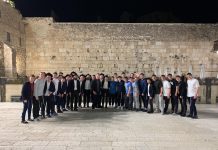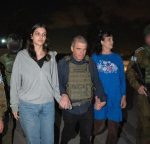By Yochanan Gordon
Eurovision is billed as the largest music competition in the world. Although it first debuted in May 1956, I hadn’t tuned in until last year. What drew me in wasn’t the music itself, but the context: seven months after October 7, with the world still reeling, Israel’s Eden Golan was set to take the European stage.
Her participation was Eurovision’s attempt to separate politics from what has long been seen as an apolitical cultural event. But that illusion shattered quickly. Golan’s original song, “October Rain,” was nearly disqualified for containing what were deemed overly political references. The lyrics were amended just enough to appease the judges, and Israel was granted a voice—a platform to speak its truth through the universal language of music. And that message resonated.
Despite needing round-the-clock security, being confined to her hotel, and getting booed live on stage, the backlash didn’t fully square with the public reception. Golan may have placed fifth in Eurovision voting, but she ranked second in global audience ratings. The support she received online—from video reviewers, commenters, and music fans—told a different story than what the media was reporting. It forced me to question just how deep the opposition really ran.
There’s a well-known parable about a king who hires a harlot to test the moral strength of his son, the prince. While she plays her role, both she and the king secretly root for the prince to pass the test. That analogy echoes today’s climate. Yes, antisemitism has surged since October 7. But part of me wonders whether, deep down, even the adversaries are waiting—perhaps praying—for Israel to rise with clarity, strength, and moral certitude. To pass the test. To make the case that ends the debate.
This year, Israel sent Yuval Raphael to represent them. Her song, “New Day Will Rise,” written by Keren Peles, is almost a spiritual sequel to Golan’s “Hurricane.” It carries a message of healing, unity, and hope—a new day beyond the darkness, found through resilience and connection.
Raphael’s survival story is harrowing. Confined to a shelter on the side of the road in Kibbutz Be’eri. Buried under piles of dead bodies, all the while on the phone with her father who advises her to play dead as terrorists converge upon the claustrophobic shelter and begin shooting rounds and hurling grenades. Only through a stroke of Divine grace Raphael emerged from there, one of 11 survivors out of the fifty people holed up in there.
Equally astonishing, however, is that before surviving the Nova massacre, she had never sung publicly, nor even dreamed of pursuing a singing career. Yet there she was—perfect pitch, otherworldly voice, stage presence beyond her years. This was her debut?
It brings to mind a Midrash about Yitzchak Avinu, who, after the akeidah, is said to have ascended to the Heavens for three years, only to return with a renewed soul. Likewise, it seems that Yuval Raphael emerged from the depths of tragedy with a new voice—a confident, transcendent voice of hope.
Like Golan, she faced boos and threats and relied on heavy security to keep the stage clear. But once again, the noise outside is just that—noise. A test of our resolve. A challenge to rise louder, stronger, and more unified than ever before.
Yochanan Gordon can be reached at ygordon5t@gmail.com. Read more of Yochanan’s articles at 5TJT.com.















